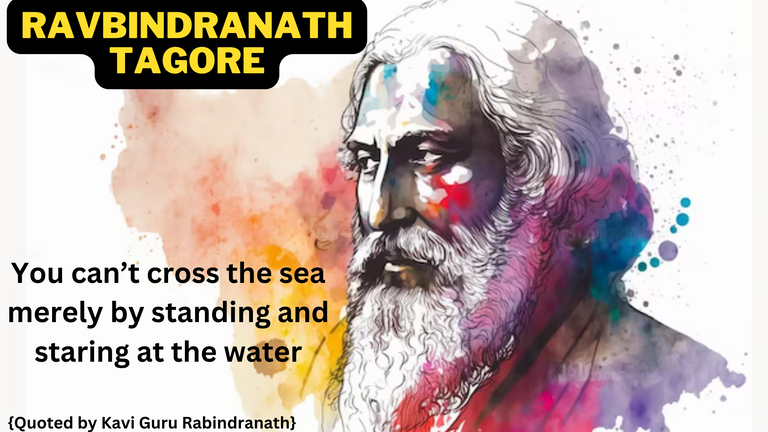'Kavi Guru' Rabindranath Tagore: A Multifaceted Genius and Literary Icon
NAMASTEY HIVERS,
I hope you all are well and spent your daily life with full of joy ness. On today's blog I am goin to write down the Autobiography Of India's Most Famous Poetry, polymath, poet, philosopher, musician, artist, and playwright.

“Let me not pray to be sheltered from dangers,
but to be fearless in facing them.
Let me not beg for the stilling of my pain, but
for the heart to conquer it.”
{Quoted by Kavi Guru Rabindranath Tagore}
I hope you love to know about his life journey ::

Rabindranath Tagore, also known as Kavi Guru was a polymath, poet, philosopher, musician, artist, and playwright. The famous person Born on May 7, 1861, in Calcutta (now Kolkata), India.
He is widely regarded as one of the greatest literary figures in modern Indian literature. Tagore's vast body of work encompasses poetry, short stories, novels, songs, essays, and plays, reflecting his multifaceted genius and his deep understanding of human emotions and the complexities of life. This essay is aims to delve into the life, works, and lasting impact of Rabindranath Tagore.
Tagore hailed from a prominent Bengali family and received a comprehensive education in both Indian and Western traditions. His early works were heavily influenced by the rich cultural heritage of Bengal, including folk traditions, classical music, and literature. Tagore's upbringing in a progressive, intellectually stimulating environment played a significant role in shaping his artistic sensibilities and his lifelong quest for knowledge.
As a poet, Kavi Guru Tagore's contributions are immeasurable. His poetry, often characterized by its lyrical beauty and profound spirituality, has resonated with readers around the world. Tagore explored a wide range of themes in his poetry, including love, nature, spirituality, and the human condition. His collection of poems, "Gitanjali" (Song Offerings), brought him international acclaim and won him the Nobel Prize in Literature in 1913, making him the first non-European to receive this prestigious award. The poems in "Gitanjali" encapsulate the essence of Tagore's poetic genius, offering deep insights into the human soul and its eternal longing for connection and spiritual fulfillment.

About his poetic prowess ::
Tagore was a social and political thinker who actively engaged with the issues of his time. He played a significant role in India's struggle for independence from British colonial rule, using his writings and public speeches to advocate for social reforms, freedom, and nationalistic sentiments. Tagore's commitment to the ideals of freedom and social justice was evident in his works such as "The Home and the World," a novel published in 1916 that explored the themes of nationalism, personal freedom, and the complexities of relationships. Through his writings, Tagore aimed to awaken the collective consciousness of the Indian people, urging them to embrace their cultural identity and strive for social progress.
Moreover, Tagore was not only a prolific writer but also a gifted musician and composer. He created a vast collection of songs known as "Rabindra Sangeet," which became an integral part of the Bengali cultural heritage. His songs, infused with poetic beauty and melodic richness, celebrate various aspects of life, love, and nature. Through his music, Tagore sought to evoke a sense of unity and harmony, transcending the barriers of language and culture.

His contributions to literature and music ::-
Tagore was an accomplished artist and visual thinker. He created numerous paintings and sketches, often accompanying his poetry and writings with his own artwork. His artistic vision blended Western and Eastern influences, and his works reflected his deep appreciation for nature and its connection to the human spirit. Tagore's artistic expressions served as a visual extension of his literary and philosophical ideas, enriching the overall experience of his works.
Kavi Guru Tagore's vision for education was revolutionary for his time. He established an innovative educational institution called Visva-Bharati University in Santiniketan, West Bengal. At Visva-Bharati, Tagore emphasized a holistic approach to education that combined academic learning with artistic and cultural pursuits. He believed that education should not be confined to the classroom but should be an exploration of the World.

Kavi guru Ravindranth Tagore's Books and poetry ::-
Rabindranath Tagore, a prolific writer and poet, produced a vast collection of books and poetry that are both profound and accessible to readers. His works cover a wide range of themes and emotions, often drawing inspiration from nature, love, spirituality, and the complexities of human relationships. Here are some notable books and poetry collections by Tagore that have made a significant impact:
Gitanjali (Song Offerings) : This collection of poems brought Tagore international acclaim and won him the Nobel Prize in Literature in 1913. "Gitanjali" features deeply lyrical and introspective verses that explore themes of devotion, spirituality, and the universal longing for connection.
*The Gardener : Published in 1913. This collection of poems reflects Tagore's contemplations on love, nature, and the human experience. The poems in "The Gardener" are characterized by their simplicity and emotional depth, resonating with readers of all ages.
The Home and the World : A novel published in 1916, "The Home and the World" explores the themes of nationalism, personal freedom, and the complexities of relationships. Set against the backdrop of India's struggle for independence, the story delves into the inner conflicts faced by its characters and raises thought-provoking questions about loyalty and individuality.
Sadhana : The Realization of Life": In this collection of essays published in 1913, Tagore delves into philosophical and spiritual concepts, discussing topics such as the nature of truth, the pursuit of knowledge, and the interconnectedness of all existence. "Sadhana" offers profound insights into human nature and the quest for meaning in life.
Chokher Bali (A Grain of Sand) : This novel, published in 1903, explores the complexities of love, desire, and betrayal. It delves into the lives of its central characters, examining their motives and the consequences of their actions, while also addressing themes of societal norms and women's empowerment.
Kabuliwala : A short story published in 1892, "Kabuliwala" tells the poignant tale of the bond between a young girl and a fruit-seller from Afghanistan. Through this story, Tagore explores themes of friendship, compassion, and the inherent goodness of humanity.
Muktadhara (The Waterfall) : This play, written in 1922, highlights social issues and the struggle for freedom. It portrays the clash between tradition and progress, advocating for individual liberty and societal transformation.
- Kavi Guru Tagore's works combine simplicity and depth, capturing the essence of human emotions and universal truths. Whether through his poetry, novels, or essays, he has left an indelible mark on literature, captivating readers with his ability to touch the heart and illuminate the human experience.

Why Ravindranath Tagore removie Knight tittle to britishers ::-
Rabindranath Tagore's decision to renounce his knighthood in protest against British policies was a significant moment in India's struggle for independence and Tagore's own activism. The incident occurred in 1919, following the Jallianwala Bagh massacre in Amritsar, Punjab.
The Jallianwala Bagh massacre was a brutal event in which British troops under the command of General Reginald Dyer opened fire on a crowd of peaceful protesters, resulting in hundreds of deaths. Tagore was deeply disturbed by this horrific incident and the British government's response, which he saw as a blatant disregard for human rights and an act of colonial oppression.
As a renowned poet, philosopher, and nationalist, Tagore felt compelled to take a stand against the actions of the British Empire. In protest, he renounced his knighthood, which had been conferred upon him by the British Crown in 1915. Tagore saw this gesture as a symbolic rejection of the colonial system and a way to express solidarity with the Indian people in their struggle for freedom and self-determination.
By renouncing his knighthood, Tagore aimed to draw attention to the injustices and atrocities committed by the British colonial administration in India. He used his position and influence to highlight the need for political and social reform, advocating for the rights and dignity of the Indian people.
Kavi Guru Tagore's act of renouncing his knighthood received widespread attention and resonated with many Indians who were seeking independence from British rule. It contributed to the growing nationalist sentiment and inspired others to actively resist British imperialism.
Overall, Tagore's decision to renounce his knighthood was a powerful statement against colonial oppression and a testament to his unwavering commitment to the ideals of freedom, justice, and self-respect. It stands as an important chapter in his legacy as a nationalist and a symbol of India's struggle for independence.

That's all for the day Guyz, I hope you enjoyed my blog.
You Guyz are awesome ☺️
Stay safe Be Cool 😎


This post has been manually curated by @bhattg from Indiaunited community. Join us on our Discord Server.
Do you know that you can earn a passive income by delegating to @indiaunited. We share more than 100 % of the curation rewards with the delegators in the form of IUC tokens. HP delegators and IUC token holders also get upto 20% additional vote weight.
Here are some handy links for delegations: 100HP, 250HP, 500HP, 1000HP.
100% of the rewards from this comment goes to the curator for their manual curation efforts. Please encourage the curator @bhattg by upvoting this comment and support the community by voting the posts made by @indiaunited.